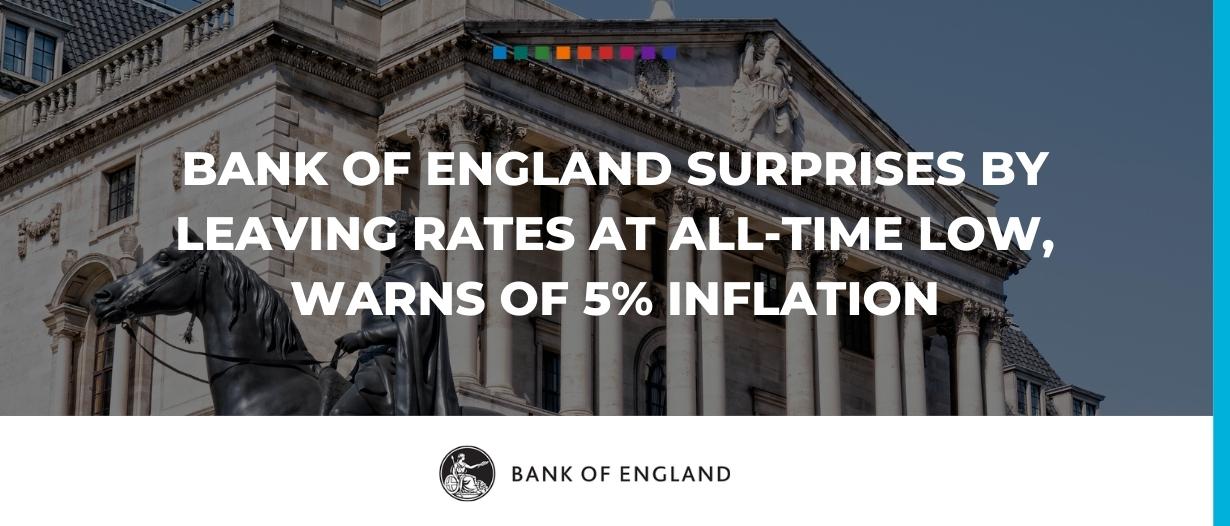The Bank of England (BoE) has surprised investors today by voting against a rise in its benchmark interest rate, which would have been its first since August 2018.
The BoE’s Monetary Policy Committee (MPC) voted 7-2 to keep the benchmark rate at an all-time low of 0.1%, sending sterling to a four-week low of $1.356 against the US dollar, and giving the euro a 0.4% boost against the pound.
The MPC also voted 6-3 in favour of continuing its UK government bond purchases at a target stock of £875 billion, and it voted unanimously to maintain its £20 billion stock of corporate bond purchases, keeping its total asset purchase programme at £895 billion.
As reported yesterday by Trade Finance Global (TFG), analysts such as Euler Hermes were expecting the MPC to raise rates to 0.25%.
The benchmark interest rate has been at the record low of 0.1% since March 2020, at the beginning of the COVID-19 pandemic, when it was seen as necessary to prevent a liquidity crisis from cascading through the wider economy.
Hints and U-turns
With only two members of the MPC voting for the rate hike, Bailey came under fire for misleading the markets, after hinting earlier that high inflation would be countered with higher rates.
Last month, Bailey said the BoE will “have to act and must do so if we see a risk, particularly to medium-term inflation and to medium-term inflation expectations.”
In September, inflation had already hit 3.1% (its highest in almost a decade), and was tipped to average at 4% over the next year, according to the Office for Budget Responsibility (OBR).
Today, as outlined in its November Monetary Policy Report, the BoE revised its inflation forecast upwards once again.
It now sees the consumer price index (CPI) peaking at around 5% in April next year – more than double its target inflation rate of 2%.
Andrew Sentance, a British economist and former member of the MPC, said it was a “shambles” for the BoE not to raise rates in the face of rising inflation, and after publicly nodding towards a rate hike.
“More misleading signals from the MPC,” Sentance posted on Twitter.
More misleading signals from the #MPC. These days, they always delay or duck the challenge of raising rates. A shambles from a so-called independent central bank. https://t.co/4hC6tpj0NB
— Andrew Sentance (@asentance) November 4, 2021
“These days, they always delay or duck the challenge of raising rates. A shambles from a so-called independent central bank.
“With inflation set to surge to 5% or more, record skill shortages, global supply shortages, surging energy prices, continuing fiscal stimulus, the Bank of England sees fit to keep interest rates at 0.1 percent – a historical record low. How can this be justified?”
Bailey said the BoE expects inflationary pressures to dissipate as supply disruption eases, global demand rebalances, and energy prices stop rising, but he was unable to provide a timeframe as to when those conditions might be met.
Instead, he insisted that rising inflation is a “transitory” problem, while admitting that there is “no fixed unit of time that is transitory”.
Worrying economic data
In addition to rising inflation, Bailey also warned that the UK economy is growing at a slower rate than expected.
After predicting in its last report that UK’s gross domestic product (GDP) would return to its Q4 2019 level in the last three months of 2021, the BoE today said it does not expect this to happen until the first quarter of 2022.
Bailey noted that although both UK and global GDP has increased in the third quarter of 2021, it has done so at a slower pace than the BoE projected in its August 2021 Monetary Policy Report.
“Growth has been restrained by disruption in supply chains, alongside the rapid pace at which global demand for goods has risen,” he said.
“This has led to supply bottlenecks in some sectors, and there have also been signs of weaker UK consumer spending.
“While supply bottlenecks will continue to restrain growth somewhat in the near-term, global and UK GDP are nonetheless expected to recover further from the effects of COVID-19.”
The BoE trimmed the UK’s growth forecast for 2021 to 7%, and revised its forecast for 2022 down from 6% to 5%.
The bank also expects growth to slow sharply to 1.5% in 2023, and down again to 1% in 2024.























